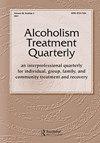酗酒者不应该设定自己的减酒目标!评估不同基于目标的青少年酒精减少干预措施的有效性
IF 0.9
Q4 SUBSTANCE ABUSE
引用次数: 1
摘要
摘要本研究旨在探讨三种类型的酒精减少干预的相对有效性。参与者是来自澳大利亚一所大学的354名大学生。在完成初步调查后,他们被随机分配(a)遵循国家酒精消费指南,(b)设定自己的个人酒精消费减少目标,或(c)与同龄人一起设定目标。然后,参与者在为期四周的饮酒日记中记录他们的饮酒量。结果表明,个人目标条件下的参与者报告的酒精消费量明显高于国家指导条件下的参与者,而团体目标条件下的参与者报告的酒精消费量为中等水平。这种影响被酗酒倾向所缓和。当参与者在酗酒倾向的测量中得分相对较高时,个人目标设定最有可能导致更高的饮酒量。这些发现强调了一点,即不同类型的酒精减少干预措施可能对不同类型的人有效。特别是,应该鼓励酗酒倾向相对较高的人遵循当局(例如国家指南)而不是他们自己设定的目标。本文章由计算机程序翻译,如有差异,请以英文原文为准。
Binge Drinkers Shouldn’t Set Their Own Alcohol Reduction Goals! Evaluating the Effectiveness of Different Goal-Based Alcohol Reduction Interventions among Young People
ABSTRACT The present research aimed to investigate the relative effectiveness of three types of alcohol reduction intervention. Participants were 354 university students from an Australian university. After completing an initial survey, they were randomly assigned to either (a) follow national guidelines for alcohol consumption, (b) set their own personal alcohol consumption reduction goal, or (c) work with their peers to set a goal. Participants then recorded their alcohol consumption in a drinking diary over a period of four weeks. The results showed that participants in the personal goal condition reported significantly higher alcohol consumption than those in the national guidelines conditions, with participants in the group goal condition reporting mid-level alcohol consumption. This effect was moderated by binge drinking propensity. Personal goal setting was most likely to lead to higher alcohol consumption when participants scored relatively high on measures of binge drinking propensity. These findings highlight the point that different types of alcohol reduction interventions may be effective for different types of people. In particular, people who have a relatively high propensity for binge drinking should be encouraged to follow goals that have been set by authorities (e.g., national guidelines) rather than by themselves.
求助全文
通过发布文献求助,成功后即可免费获取论文全文。
去求助
来源期刊

Alcoholism Treatment Quarterly
SUBSTANCE ABUSE-
CiteScore
1.60
自引率
11.10%
发文量
31
期刊介绍:
Alcoholism Treatment Quarterly is an exciting professional journal for clinicians working with persons who are alcoholic and their families. Designed to bridge the gap between research journals and information for the general public, it addresses the specific concerns of professional alcoholism counselors, social workers, psychologists, physicians, clergy, nurses, employee assistance professionals, and others who provide direct services to persons who are alcoholic. The journal features articles specifically related to the treatment of alcoholism, highlighting new and innovative approaches to care, describing clinical problems and solutions, and detailing practical, unique approaches to intervention and therapy.
 求助内容:
求助内容: 应助结果提醒方式:
应助结果提醒方式:


